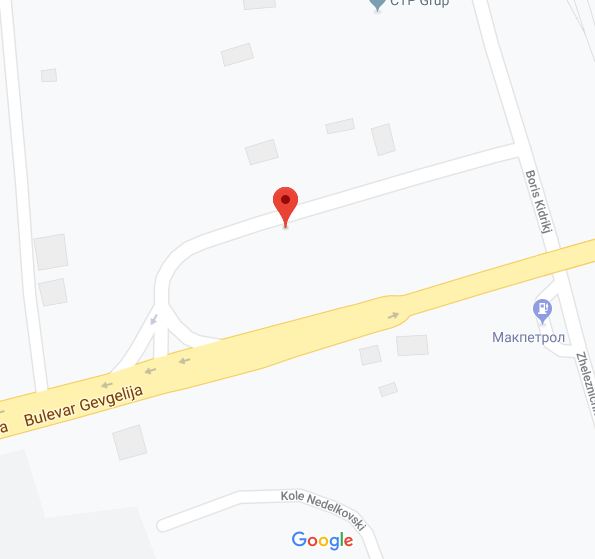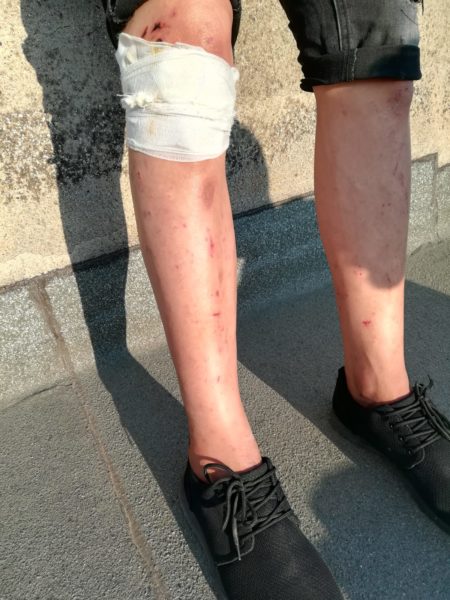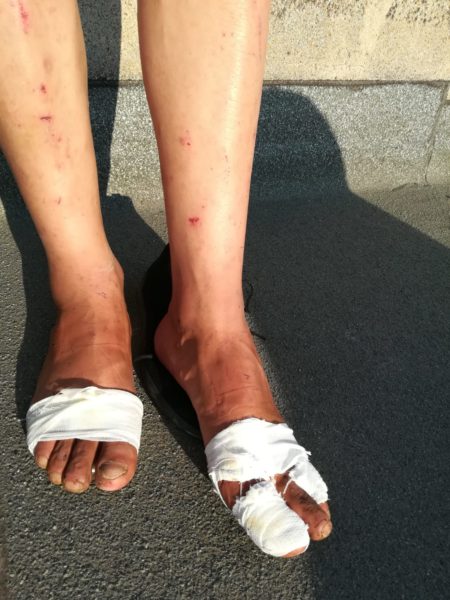They treated me like a dog
| 22.07.2019 | Gevgelija, North Macedonia | Mobile Info Team | 41.147494, 22.51097 | North Macedonia | Greece | yes | no | yes | no | no | no | no | 27 - 27 | 1 | Tunisia | detention, fingerprints taken, personal information taken, denial of food/water | 3 | Pressing the wounds of the respondent. | 2 Macedonian Policemen, 1 police van. |
The respondent, aged 27 and from Tunisia, started his journey from Thessaloniki (Greece) Railway Station on 21st July 2019. He took a freight train and jumped off at Edomini, Greece at approximately 00:00 that night. As a result of jumping, he suffered severe injuries. According to the respondent’s personal experience and that of his friends who used the same train before, he felt that the drivers of the train deliberately speed up the train near the Greek - Macedonian border suspecting that some people travelling in the train might jump off to avoid detection.
The respondent then started walking towards North Macedonia and at night, he crossed the border from Greece and entered North Macedonia. Once entering the country, he walked to a railway station and slept there. It was here in the morning on 22nd July 2019, at around 09:30 he was caught by the authorities which the respondent termed as Macedonian police, since he saw Macedonian flags affixed to their uniform (approximate coordinates: 41.147494, 22.510977).
According to the respondent, the two policemen arrived in a police car and arrested him. He was ordered to walk from the point of apprehension until the police station (see Figure 1) in the injured condition for 15 minutes.
[caption id="attachment_13111" align="alignnone" width="595"] (Figure 1:Google map of the Police Station. Approximate coordinates 41.147926, 22.508821.[/caption]
The respondent tried to explain to the police that he could not walk in this injured condition. Instead of listening to his plea, the policemen started pressing his wounds to force him to walk.
“They treated me like a dog”
(Figure 1:Google map of the Police Station. Approximate coordinates 41.147926, 22.508821.[/caption]
The respondent tried to explain to the police that he could not walk in this injured condition. Instead of listening to his plea, the policemen started pressing his wounds to force him to walk.
“They treated me like a dog”
 (Figure 2: injuries to the respondents leg that impeded walking)
[caption id="attachment_13110" align="alignnone" width="450"]
(Figure 2: injuries to the respondents leg that impeded walking)
[caption id="attachment_13110" align="alignnone" width="450"] (Figure 3:The wounded body areas of the respondent which were pressed by the police)[/caption]
In the police station, the respondent was put behind bars in a room for one hour which he referred to as a “jail”. He saw many people of different nationalities detained in the facility.
Afterwards, he was taken to a building near the Macedonian Greek border which respondent described as a camp with small rooms and each having an attached toilet as well. Over here, the respondent was asked to provide his personal data and fingerprints by a woman translator in civilian clothes. According to the respondent, the translator compelled him to get himself registered as an Egyptian, not as a Tunisian.
However, the respondent didn’t succumb to this pressure and told her to register him as a Tunisian as he was from Tunisia. Since the translator spoke the respondent’s language, he asked her for medical help since he had injuries but wasn’t provided any kind of aid during his detention. The respondent also asked for food and water which wasn’t provided to him. Afterwards, he was put behind the bars in a small room in the camp where he met people including children and women who were also being detained.
According to the respondent, soon a blue police van arrived with one policeman and he was put in it along with another man from Afghanistan. After 5 minutes driving, at around 14:30 (22nd July 2019) they were on the other side of the border in Greece.
(Figure 3:The wounded body areas of the respondent which were pressed by the police)[/caption]
In the police station, the respondent was put behind bars in a room for one hour which he referred to as a “jail”. He saw many people of different nationalities detained in the facility.
Afterwards, he was taken to a building near the Macedonian Greek border which respondent described as a camp with small rooms and each having an attached toilet as well. Over here, the respondent was asked to provide his personal data and fingerprints by a woman translator in civilian clothes. According to the respondent, the translator compelled him to get himself registered as an Egyptian, not as a Tunisian.
However, the respondent didn’t succumb to this pressure and told her to register him as a Tunisian as he was from Tunisia. Since the translator spoke the respondent’s language, he asked her for medical help since he had injuries but wasn’t provided any kind of aid during his detention. The respondent also asked for food and water which wasn’t provided to him. Afterwards, he was put behind the bars in a small room in the camp where he met people including children and women who were also being detained.
According to the respondent, soon a blue police van arrived with one policeman and he was put in it along with another man from Afghanistan. After 5 minutes driving, at around 14:30 (22nd July 2019) they were on the other side of the border in Greece.
